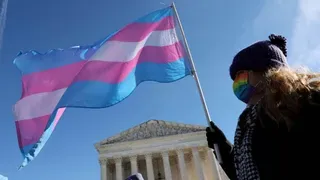October 2, 2016
Voter ID Laws Could Prevent 34,000 Trans People from Voting
Rhuaridh Marr READ TIME: 2 MIN.
A new study has found that over 34,000 transgender people may be prevented from voting in the upcoming election due to strict voter ID laws.
The study, "The Potential Impact of Voter Identification Laws on Transgender Voters in the 2016 General Election," was released by UCLA School of Law's The Williams Institute - a think tank focused on sexual orientation and gender identity law and public policy.
Its author, Williams Institute Scholar Jody L. Herman, Ph.D., used data from the National Gay and Lesbian Task Force and the National Center for Transgender Equality to look at voter ID laws in eight states: Alabama, Georgia, Indiana, Kansas, Mississippi, Tennessee, Virginia and Wisconsin.
In those states, around 112,000 transgender are estimated to have transitioned and be eligible to vote, but about 30% may be prevented from doing so.
The reason? A lack of identification that accurately reflects their correct gender, according to the study. Currently, thirty-four states have voter ID laws that require someone to produce an "acceptable" form of identification to poll workers in order to vote. The strictest forms of those laws require government-issued ID, which is where transgender people face a potential barrier.
Those most likely to lack proper identification include "[t]ransgender people of color, youth, students, people with low income, and people with disabilities," Herman found.
In order to obtain proper ID, trans individuals are forced to comply with both state and federal requirements, which can "vary widely by state" and also be "difficult and costly to meet," according to the study. It concludes by noting that voter ID laws "will create a unique barrier to voting in the November 2016 general election for a substantial number of transgender citizens."
While Helman only studied eight states, if the number of trans people without proper identification holds true nationwide (around 27%, according to one survey), about 261,000 trans individuals lack updated ID or records.
"Lawmakers and election officials should not overlook the impact on transgender voters when enacting voting restrictions based on identity documents," said Herman. "Voter ID laws impact many citizens who would otherwise be eligible to vote. Transgender people have unique, and sometimes insurmountable, burdens to obtaining accurate IDs for voting in states that require it.
"Legislators, election officials, and poll workers should work to ensure equal access to the ballot for transgender voters, who have a disparate burden under voter ID laws," Herman added.



